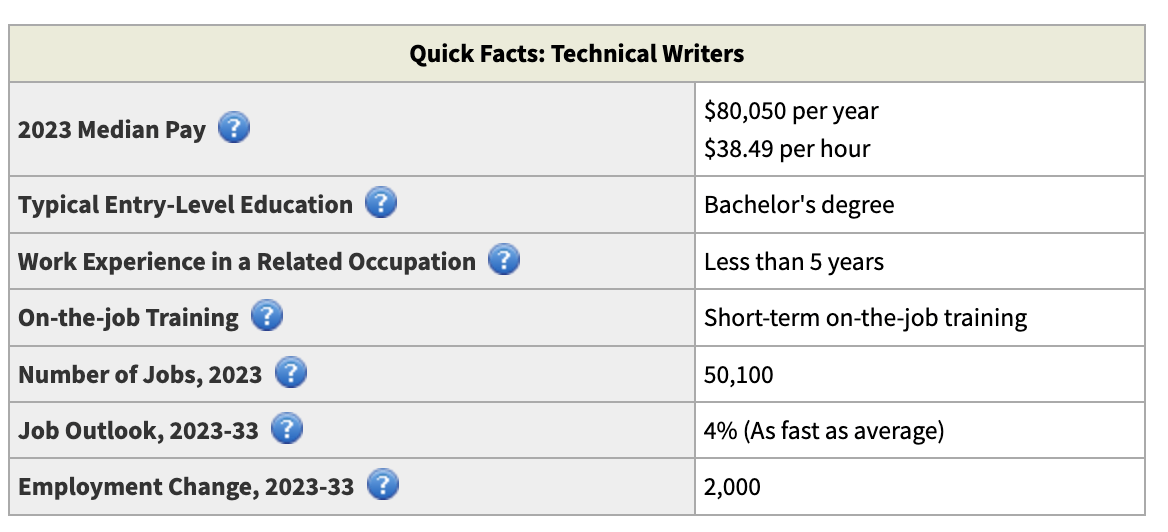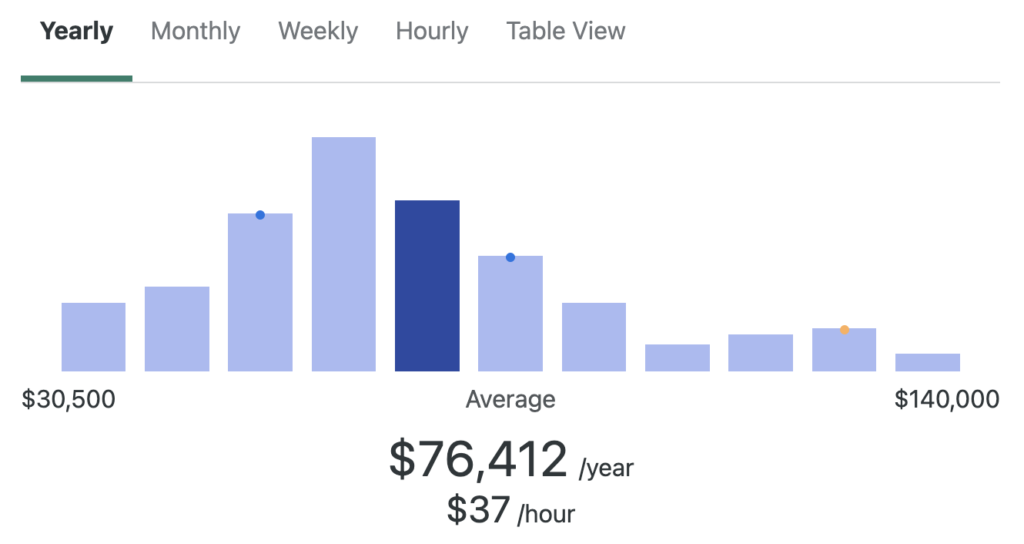You see people online talking about six-figure incomes, working from beaches, and living the dream life—all thanks to copywriting. But is it really all it’s cracked up to be, or is it just hype?
The truth is, copywriting can be an incredibly rewarding career if you approach it the right way. It’s not just about writing—it’s about persuasion, psychology, and driving results. If you can master these, the sky’s the limit.
I’ve done copywriting for the last 10 years and made six-figures as a freelancer myself.
Ahead, let’s break down what makes copywriting a good career and how you can get started.
The Demand for Copywriters Is Real
First off, let’s address the elephant in the room: is there still demand for copywriters? Yes, absolutely.
With more businesses going online, the demand for digital content is soaring. According to Statista, there are over 5 billion internet users globally.
Every company wants a piece of that action, which means they need good copy. Websites, email campaigns, ads, social media—it all requires solid writing.

The U.S. Bureau of Labor Statistics projects that the employment of writers and authors will grow 4% from 2022 to 2032, keeping pace with the average for all occupations.

But if you zoom in on copywriting specifically, the numbers look even better. Businesses need writers who understand digital marketing, user experience, and how to create content that drives conversions.
The digital economy is only expanding—e-commerce is growing, startups are thriving, and content marketing is becoming the backbone of many brand strategies. All of these businesses need effective copy to succeed.
The Skills You Need to Thrive
So, what skills do you need to make copywriting a good career choice for yourself? It’s not just about having a way with words—you need to understand marketing, sales psychology, and the impact your words have on a business.
1. Understanding Persuasion and Human Psychology
Copywriting is all about persuading someone to take action. Whether that’s buying a product, signing up for a newsletter, or just clicking on a link—it’s all about getting people to do something. This means you need to understand how people think.
Start with the basics: social proof, scarcity, reciprocity, and authority. These are the tools you’ll use to influence people’s decisions. But to really stand out, go beyond that. Learn about cognitive biases, behavioral economics, and why people make the decisions they do.
If you can tap into what motivates someone—their fears, desires, and needs—you’ll be able to write copy that moves them.
2. Research Skills Are Essential
Good copywriting is backed by research. You can’t just throw words on a page and hope for the best. You need to understand your audience inside and out—their pain points, desires, and objections. You also need to know what your competitors are doing, what’s working in the market, and what’s not.
This research will form the foundation of your copy. If you can understand what makes your audience tick, you’ll be able to write messages that resonate and convert.
3. Adaptability in Your Writing Style
Different platforms require different writing styles. A Facebook ad needs to grab attention instantly, while a blog post needs to educate and provide value. As a copywriter, you need to be able to switch gears and adapt your tone depending on the platform and audience.
This versatility is what makes you a valuable asset to businesses. They need writers who can handle every type of content—from punchy ad copy to in-depth articles.
How Much Money Can You Make as a Copywriter?
Let’s get into the numbers—because we all want to know if copywriting pays the bills (and maybe even funds that dream lifestyle).
According to Glassdoor, the average annual salary for a copywriter in the United States is around $76,412.

Of course, this number varies depending on experience, location, and industry. Entry-level copywriters might make between $40,000 and $50,000, while experienced copywriters can make well into the six figures.
Freelancers have an even broader range. Some freelancers charge as little as $10 per hour, while others charge upwards of $300 per hour. It all comes down to the value you provide and how you position yourself in the market.
If you specialize in areas like conversion copywriting, where the focus is on driving sales and measurable results, you can command much higher rates. For example, a well-crafted email sequence that brings in $100,000 in sales is worth a lot to a business—and they’ll pay you accordingly.
The Freelance vs. Full-Time Debate
One of the biggest draws of copywriting as a career is the flexibility. You can go the freelance route, start your own business, or work full-time for a company. Each path has its pros and cons.
- Freelancing: Offers freedom, higher earning potential, and the ability to work with different clients. But it comes with instability, and you need to be good at self-promotion and client management.
- Full-Time Employment: Provides stability, benefits, and consistent pay. You’ll also get to work within a team, which can be great for learning and growth.
- Agency Work: Somewhere in between freelancing and full-time. You get exposure to a variety of clients, but you may also face tight deadlines and a fast-paced environment.
Ultimately, whether freelancing or full-time is better depends on your personality, goals, and how much risk you’re willing to take on.
How to Get Started in Copywriting
If you’re interested in starting a career in copywriting, here’s a step-by-step roadmap to help you get there.
1. Learn the Basics
Before you start offering your services, you need to learn the fundamentals of copywriting. Study the basics of marketing, understand sales funnels, and learn about customer psychology.
You can take courses, read books, and follow established copywriters to learn the ropes. Books like “Influence: The Psychology of Persuasion” by Robert Cialdini and “Everybody Writes” by Ann Handley are great places to start.
Courses like those offered by Copyhackers or AWAI can also give you a solid foundation.
2. Create a Portfolio
No one will hire you without seeing proof that you can write. Create a portfolio that showcases your skills. You don’t need real client work to start—you can write mock projects.
Create sample Facebook ads, email sequences, blog posts, and landing pages. Your portfolio doesn’t need to be huge, but it does need to show a variety of styles and demonstrate your ability to write for different audiences.
3. Start with Small Projects
Once you have a portfolio, you can start looking for work. Platforms like Upwork and Fiverr are great places to get started and gain experience. However, remember that these platforms are competitive, and you’ll likely need to start with lower rates to build your reputation.
But don’t stay there forever. Use these initial projects to gather testimonials, build case studies, and learn the business side of freelancing—then move on to bigger and better opportunities.
4. Network and Market Yourself
To succeed as a copywriter, you need to market yourself. Create a LinkedIn profile that acts as a sales page for your services. Start writing content on LinkedIn to attract potential clients. You can also join Facebook groups where business owners hang out, answer questions, and offer value.
Building relationships and getting referrals is one of the best ways to grow your business. Remember, people are more likely to hire someone they know or who has been recommended to them.
5. Continue Learning and Improving
Copywriting isn’t static. Trends change, consumer behaviors shift, and platforms evolve. You need to keep up with the latest in marketing and always work to improve your skills. Follow industry blogs, read new books, and keep practicing your craft.
The Challenges of a Copywriting Career
While copywriting can be a great career, it’s not without its challenges. It’s important to know what you’re getting into.
1. The Competition
Yes, there’s competition. A lot of people are trying to break into copywriting, and that means you need to stand out. The good news is, most of your competition won’t put in the effort to improve their skills or learn about business and marketing—so if you do, you’re already ahead.
2. Clients Can Be Demanding
If you’re freelancing, clients can sometimes be difficult. They might want multiple revisions, expect you to work weekends, or not understand the value of good copy. You need to learn how to manage client expectations and set boundaries.
3. Dealing with Rejection
Rejection is part of the game. You won’t win every project, and sometimes you’ll face criticism. The key is to not take it personally—use it as a learning opportunity and move on.
Why Copywriting Is Worth It
Despite the challenges, copywriting is one of the most rewarding careers out there—if you’re willing to put in the work. Here’s why.
1. You Can Work From Anywhere
All you need is a laptop and an internet connection. Whether you want to work from home, a coffee shop, or a beach, it’s up to you. This kind of freedom is rare in most jobs and is one of the main reasons people are drawn to copywriting.
2. You’re Always Learning
Copywriting is about more than just writing. You learn about psychology, marketing, different industries, and even a bit of tech. The learning never stops, which means you’re always growing. This makes the career interesting and keeps you engaged.
3. High Income Potential
If you get good at copywriting, the income potential is substantial. Businesses will pay a lot for copy that drives results. If you specialize in areas like conversion copy or work with high-ticket clients, you can easily make six figures or more.
4. It’s About More Than Just Writing
Copywriting is about making an impact. It’s about understanding what makes people tick and using that knowledge to help businesses grow. It’s creative, challenging, and incredibly rewarding when you see your work drive results.
The Future of Copywriting
Is there a future in copywriting? Absolutely.
With AI tools like ChatGPT and Jasper, some people worry about the future of copywriting. But here’s the truth—tools can help generate content, but they don’t understand nuance, context, or emotions the way a human does. They can assist copywriters, but they can’t replace them.
Businesses need writers who can connect on a human level. They need someone who can bring their brand to life, speak directly to their audience, and craft messages that drive action. That’s something AI just can’t do—at least, not yet.
In fact, with more content being created, there’s more demand than ever for skilled copywriters who can cut through the noise and create messages that actually resonate.
Final Thoughts: Is Copywriting a Good Career?
So, is copywriting a good career? If you’re looking for a career that offers freedom, variety, and a high income potential, then yes—copywriting is a great choice. But it’s not a get-rich-quick scheme. It takes time to learn, build a reputation, and develop your skills.
If you’re willing to put in the work, though, the rewards are worth it. You get to work with amazing brands, write content that drives results, and have the flexibility that few other careers offer.
Schedule a free consultation to learn more about my marketing services that will help your business drive more revenue.














